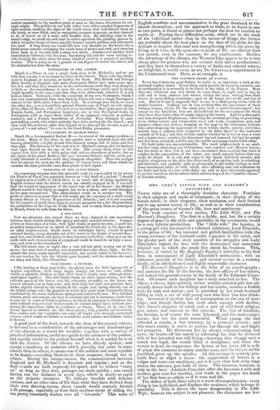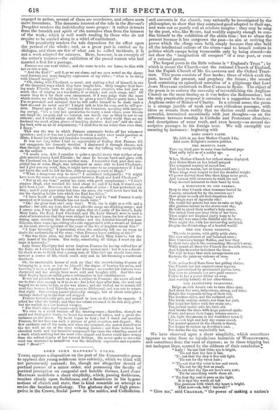MRS. GREY ' S LITTLE WIFE AND BARONET ' S
DAUGHTERS.
THESE tales are of a thoroughly feminine character. Feminine in their subjects and mode of treatment ; in their display of the female mind; in their elegance, their weakness, and their limited not to say narrow survey of life ; as well as in their consideration of the great events of woman's life, love and matrimony. The work consists of two stories, The Little Wife, and The Baronet's Daughters. The first is a feeble, and, but for a certain degree of grace in the style and amiability in the sentiments, would be a very inferior production. The "little wife," the heroine, is a young girl who has married a talented nobleman, Lord Elmsdale, in the prime of life : her innocent and girlish familiarities with the young secretary of her husband excite a passion in his mind, and the greater part of the story consists of his struggles and Lady Elmsdale's regrets for him, with the determined and somewhat original way in which she sends him about his business. This,. however, is varied by Mr. Reginald Stanley's infidelity to his first love, in consequence of Lady Elmsdale's attractions ; with an elaborate portrait of his father, and several scenes in a country family, of an old-fashioned and highly respectable character.
The Baronet's Daughters is in the form of an autobiography ; and narrates the life of the heroine, the love affairs of her sisters„ and indeed the general events in the family of Sir Edmund Carys- fort. Of course each daughter has a story attached to her. The eldest, a clever, high-spirited, rather worldly-minded girl, but ad- mirably drawn both in her failings and her merits, marries a foolish lord, for rank and station ; and is punished by her weak husband falling in with a set of wild young men who lead him into drink- ing. Gertrude Carysfort dies of consumption on the eve of mar- riage; and though fiction has dealt often enough with decline, Mrs. GREY'S elegance of mind, and a sort of well-bred religion, give nature and interest to this episode. The fate of Adelaide, the heroine, is of course the most laboured, and the most conspi- cuous; but not the most successful. When young, she had offended a cousin, a low attorney, by a personal remark ; and this man's enmity is made to pursue her through life and blight her prospects. He distresses her-by always communicating bad news ; he breaks off her match by informing her that the divorced wife of her intended was still living,—knowing that though such a match was legal, she would think it irreligious ; and when the woman is dead, he suppresses the letters of her lover, till in a fit of pique she consents to marry another man, and the lawyer on his deathbed gives up the epistles. All this revenge is scarcely pro- bable from so slight a cause : the suppression of letters is a vulgar and worn-out machinery, nor is it very clear how or by what means the attorney gets hold of them. The romance, however, is only in the love : Adelaide Carysfort, after she becomes a wife and mother, gets over her troubles, and reads in the paper the death of her first love as calmly RS if' it were real life. The defect of both these tales is a want of comprehension : every thing is too individual, and displays the weakness which belongs to speciality. This is shown the most disagreeably in The Little Wife; because the subject is not pleasant, the characters are less
engaged in action, several of them are overdrawn, and others seem mere inventions. The domestic interest of the tale in the Baronet's Daughter renders the individuality more proper : it rather detracts from the breadth and spirit of the narrative than from the interest of the work; which is well worth reading by those who do not require to be carried along in a whirl of excitement.
This peculiarity renders the tale dependent for its effect upon the perusal of the whole ; and, as a great part is carried on by dialogue, and there are few of what can be called incidents, it is not a work adapted for extracts. Here, however, is an example of the writer's manner—the exhibition of the proud woman who had married a fool for a peerage.
Frances was our next visiter; and she came to take me home, to dine with her en tete-cl-tete.
"And the Earl?" said I, as we sat alone, and my eyes rested on the sharp- ened features and more haughty expression of my sister ; "what is he doing with himself tonight ? "
"Oh, dining with Cheshunt, as usual, and making a fool of himself, in one of the thou:40nd ways which they have taught him. Only imagine their hav-
ing made Ellerslie learn to sing songs poor creature, who had just as much idea of singing as a tea-kettle, if so much ; and such songs, too! Of course they do it for their own amusement, if I may judge from the roars which deafen me till daybreak, when he gives a men's dinner-party here; but
I'M so provoked and annoyed that he will suffer himself to be made such a butt of—and he never sees it ! I might talk to him for ever, and he still per-
sists. Depend upon it Ada," continued the Countess, speaking with increas-
ing energy, "it's a very bad speculation to marry a man whom your friends CM laugh at : no gold, and no coronet, can dazzle one so blind as not to see
ridicule ; and I would rather stand the sneers of a whole world than see my husband the mark of:one glance of mocking derision. And yet," said she sink- ing hack with an air of despondency, "I shall live to see worse than even that, I fancy."
This was the way in which Frances constantly broke off her vehement speeches; and as it was not a subject on which a sister even could question or
Mate, I found her hints and innendos incomprehensible. • * * It was not long before I had an opportunity of finding that Frances did not exaggerate her domestic troubles. I discovered it through chance, and that through my aunt Daubigny, who was one day talking very energetically on the subject. "I assure you, Ada, I consider it quite a special mercy that neither of my girls married young Lord Ellerslie; for since he became hand-and-glove with the Cheshunt set, he has been another man. 1 remember that poor dear mis- guided boy of mine, Hugh, was introduced at some club to Lord Cheshunt ; and I give you my word, Ada, it might have come to an acquaintance if I had not burnt the card he left for him, without saying a word to Hugh." "What a dangerous step to take!" I exclaimed indignantly; "it might have been the cause of a serious quarrel between Hugh and Lord Cheshunt." "Not at all, my dear," smiled my aunt, with great complacency : "I don't suppose Hugh ever troubled his head about it ; and if he had, it would only have been a cut. However, that was no affair of mine : I had performed my duty ; and if your poor sister had done the same, she would never have had to rue the shocking habits into which the Earl has fallen."
"I have heard of nothing but the singing," said I; "and Frances is only annoyed at it because Ellershe has not much voice."
"Oh! she gives that out ? only that ? Well, she is right as a wife and a mother : but still, my dear, that is not all—the songs are drinking-songs ; and I assure you, I was told the other night, that at a party of his sister's, Lady
Mary Lane, the Earl, Lord Cheshunt, and Mr. Lane himself, were in such a state of intoxication that they were obliged to be sent home, for fear of their in- sisting upon entering the drawing-room ; and the Admiral himself saw poor Ellerslie, three weeks ago, sitting at a side supper-table with a wreath of flowers on his head, utterly ignorant of the cause of the fits of laughter round him !' "I hope fervently," I ejaculated, when the authority left me no room to doubt the authenticity of the story, "that Frances knew nothing of this?" "She was there once, my dear, the night of Lady Mary Lane's; but she only heard of the flowers. But really, considering all things, I must say she bears it heroically."
Lady Grace Daubigny had never forgiven Frances for having robbed her of the Earl; so I allowed her to exhale her pity unmolested : but it was a dread-
ful shock to me to think that a young man of Ellerslie's age should have com- menced a course of life, which' could only end in his becoming a confirmed drunkard.
Oh, the unutterable horror of such an idea! the overwhelming disgrace of belonging to a man so lost to himself! the shame of bearing his name, and knowing it to be a degraded one ! Poor Frances! no wonder her features were sharpened and her stately brow more cold and haughty still. And this was what Regina Spencer called quite a reformation in her establishment. It was not possible to touch on such a subject to Frances; she never allowed use to draw near enough to it to do so : but a few days after this, she sent and begged me to come to her, as she was alone ; and she wished me to remain till next day, because Lord Ellerslie was gone to Richmond, and was not to return that night. Our evening passed pleasantly enough, but at about midnight a carriage dashed up to the door and stopped.
Frances turned deadly pale, and seemed to lean on the table for support. I asked her what she feared; and then her colour returned in its rich deep glow ; but she replied, in a low hurried whisper, " For God's sake, don't speak—only listen!"
We were in a small boudoir off the drawing-room ; therefore, though we could not distinguish words, we heard the murmur of voices, and a great dis- turbance on the stairs. My heart began to beat ; but I dared not question Frances, for her face was such a picture of grief, vexation, and disgust. She
flew suddenly out of the room, and when she returned, she seated herself over the fire with an air of the most withering disdain ; and from between her clenched teeth and her beautiful compressed lips came the whistling sound of a word, which nothing but the most utter disgust and horror could have wrung
from the refined depths of her tutored feelings. She never spoke to me—the word was muttered to herself—it was the dreadfully expressive and repulsive word "Beast!"



























 Previous page
Previous page